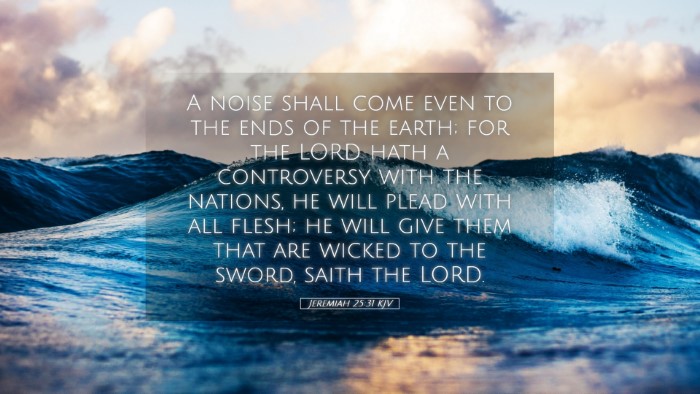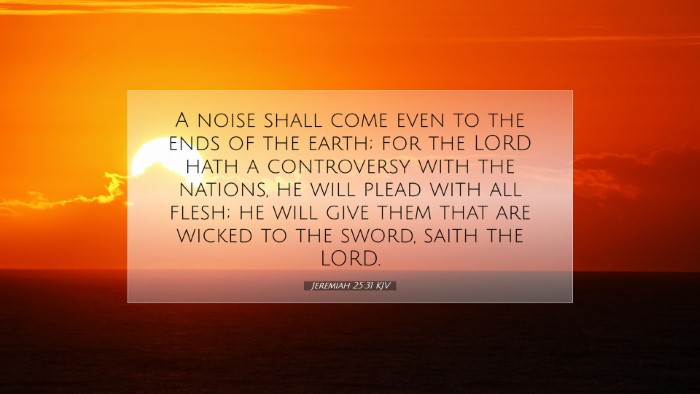Commentary on Jeremiah 25:31
Jeremiah 25:31 states, "The noise shall go even to the ends of the earth; for the LORD hath a controversy with the nations, he will plead with all flesh; he will give them that are wicked to the sword, saith the LORD." This verse presents a profound revelation of God's judgment and the extent of His sovereignty over all nations. Below, we explore various insights from acclaimed public domain commentaries.
Contextual Overview
Jeremiah, known as the weeping prophet, delivered messages of warning and judgment to a people who were often unresponsive to God's calls for repentance. This chapter serves as a climax in God's dealings with Israel and other nations. The verses leading to 25:31 establish a context where God is proclaiming a universal judgment upon the nations due to their wickedness.
Insights from Matthew Henry
Matthew Henry emphasizes the weight of the divine controversy with nations. He explains:
- Divine Accountability: Henry illustrates that God is sovereign over all the earth and stands as a righteous judge. The noise of judgment is a proclamation that will resonate across the globe, bringing awareness to all of humanity regarding divine justice.
- Nature of Judgment: He points out that God's ‘pleading’ with all flesh signifies a serious judgment and accountability. The term 'sword' symbolizes both physical destruction and spiritual severance from God’s favor.
- The Extent of Judgment: The reference to the noise reaching the ends of the earth accentuates that God's judgment is not limited to Israel but is a universal proclamation affecting all nations.
Insights from Albert Barnes
In his commentary, Albert Barnes provides a deeper theological interpretation:
- Controversy with Nations: Barnes elucidates that the phrase ‘a controversy with the nations’ implies God’s legal case against them. It shows that God, in His righteousness, holds the nations accountable for their iniquities.
- Judgment as an Inevitable Outcome: The concept that God will ‘give them that are wicked to the sword’ communicates a sense of inevitability in judgment for unrepentant sinners, portraying God's justice as an essential aspect of His character.
- Universal Call to Repentance: Barnes also sees this verse as an indicator of God’s desire for all nations to seek repentance. It serves as a divine summons for acknowledgment of sin and a call to moral rectitude.
Insights from Adam Clarke
Adam Clarke offers a poignant interpretation by delving into the implications of the verse:
- The Global Implication of God's Judgment: Clarke highlights that God’s voice is amplified throughout the earth, showcasing His omnipotence and the universality of His reign.
- Nature of the ‘Sword’: Clarke elaborates on the phrase ‘to the sword’ as a representation of both physical destruction and spiritual separation, emphasizing that divine judgment may take various forms, often reflective of God’s multifaceted nature.
- Hope Amid Judgment: Despite the grim nature of the judgment described, Clarke points to the underlying hope found in God's faithfulness to His mercy, implying that repentance may still invoke divine grace.
Theological Implications
From the insights provided by these scholars, several theological implications arise:
- God's Sovereignty: The passage reinforces the belief in God's ultimate sovereignty over all nations and His authority to judge based on moral conduct.
- Moral Accountability: The notion that nations have a responsibility to align with divine statutes highlights the significance of ethical behavior in relation to God's laws.
- The Seriousness of Divine Judgment: The imagery of the sword serves as a stark reminder to all entities of the consequences of turning away from God's commandments.
- Hope for Nations: Embedded in the text is a call for repentance and an opportunity for nations to realign with God’s purpose, signaling His desire for restoration and reconciliation instead of mere destruction.
Practical Applications for Today
For pastors, students, theologians, and Bible scholars, the reflections on Jeremiah 25:31 can translate into several practical applications:
- Call to Advocacy: Just as Jeremiah called the nations to recognize their moral failings, today's believers are called to advocate for righteousness in their own communities.
- Encouragement for Repentance: The idea that there is still room for repentance before God's judgment is a foundational message that can bring hope to those who have strayed.
- Global Awareness: The global implications of this verse encourage Christians to maintain a stance of prayer and action regarding international issues of justice and morality.
- Preparation for Judgment: Understanding the seriousness of divine judgment should motivate believers to live with integrity and faithfulness, preparing their lives for accountability before God.
Conclusion
Jeremiah 25:31 serves as a powerful document of divine judgement, emphasizing God's sovereign authority and the call for nations to reflect on their moral paths. It leads believers to the heart of God's desire for justice interwoven with mercy. The commentary provided by notable scholars allows for a deeper understanding of this verse, underpinning the fact that God remains invested in the righteousness of nations, urging them toward repentance while simultaneously upholding His justice.


